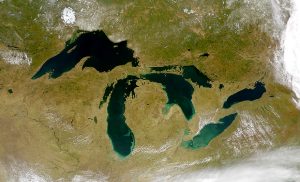I have recently written in this space about several legal and policy matters of current importance to the Great Lakes, including the city of Waukesha, Wisconsin’s application for a diversion of Great Lakes water pursuant to the Great Lakes Compact; the potential invasion of the Great Lakes by a voracious non-native species of fish, the Asian carp;  and President Trump’s budget proposal to completely defund the Great Lakes Restoration Initiative (GLRI), a federal program that enjoys strong bipartisan support and supports approximately $300 million in Great Lakes projects annually. There have been important developments on all three fronts over the past few weeks.
and President Trump’s budget proposal to completely defund the Great Lakes Restoration Initiative (GLRI), a federal program that enjoys strong bipartisan support and supports approximately $300 million in Great Lakes projects annually. There have been important developments on all three fronts over the past few weeks.
Waukesha diversion. The last remaining major barrier to Waukesha’s diversion of Great Lakes water for its public supply has fallen. The Great Lakes-St. Lawrence Cities Initiative (“Initiative”), which had challenged the June 2016 diversion approval the City received from the Great Lakes Compact Council, announced that it would not pursue further remedies in federal court. The Compact’s dispute resolution provisions, though vague in some respects, clearly provide a challenger with the right to such an appeal. Previously, the Council granted the Initiative an administrative hearing and the city intervened. After both sides briefed the matter, the Council affirmed its previous decision. Now that the Initiative has forgone a judicial remedy, the Council’s decision will stand. Waukesha still must obtain certain state approvals and must negotiate a supply agreement with Oak Creek or (surprisingly) Milwaukee, but those are believed to be minor obstacles compared with obtaining Council approval.
Great Lakes Restoration Initiative. Congress appears poised to reject President Trump’s budget proposal to wipe out funding for the GLRI, a popular program that has underwritten over 3,400 projects in the Great Lakes since 2010 through awards by fifteen federal agencies for everything from industrial harbor remediation to invasive species control. On July 11, the House Appropriations Committee released a draft spending bill restoring full funding for the GLRI ($300 million for 2018). A few weeks later, the Environmental Protection Agency—headed by Trump appointee Scott Pruitt—released a report trumpeting GLRI success stories. That was ironic at best given the administration’s wipeout budget proposal only a few months before.
Asian carp invasion. On August 6, the United States Army Corps of Engineers released a long-awaited plan to keep Asian carp from the Great Lakes. As I noted in my earlier post, the Trump administration had been criticized for delaying the plan’s release. The Corps has chosen a “gauntlet” approach that includes noise devices, water jets, a flushing lock, and electric barriers. Notably, the Corps did not recommend severing the artificial connection between the Great Lakes and Mississippi River basins, which would have been the only method fully certain to stop the carp. I also wrote here that the although the Seventh Circuit had twice rejected an action seeking that severance, it invited the plaintiff states (Michigan, Wisconsin, and others) to re-file if “reliable facts show that the carp pose a more immediate threat to the Lakes, or when the Corps and the Metropolitan Water Reclamation District of Greater Chicago slacken their efforts to prevent the passage of the Asian carp out into Lake Michigan.” If the Corps implements the new plan, it seems likely—but far from certain—that it will prevent further legal action for the time being.
